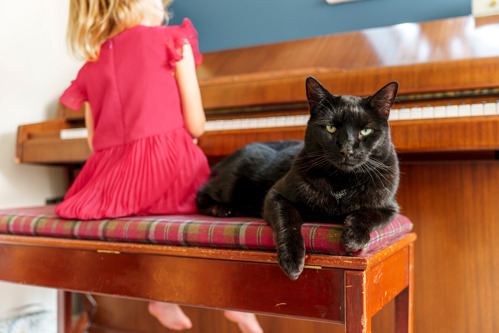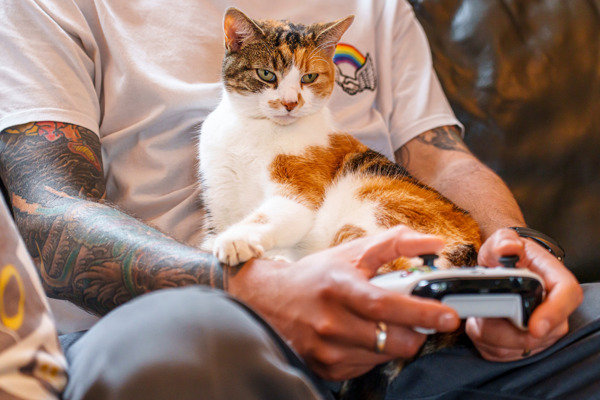Cats usually prefer ‘cat music’ made specifically for them
Whether you like to rock out to heavy metal or prefer the soothing tones of classical compositions, there’s a genre of music to suit everyone. But what about our furry friends? Do cats enjoy listening to music? And if they do, what kind of music do cats like?
Scientists have been trying to find the answer. Let’s look at two recent scientific studies on the effects of music on cats.
Do cats like music?
“Scientific studies show that in certain contexts cats can behave in ways that suggest they do like music,” says Daniel Warren-Cummings, a Clinical Animal Behaviourist registered with the Animal Behaviour & Training Council. “But it’s important to remember that this is a new area of research and these studies have limitations. They are conducted in controlled environments within short timeframes.
“Like humans have differing tastes in music, all cats are different. They will each have their own preferences. Many cats will prefer quiet, especially when they’re sleeping or hiding.”

What kind of music do cats like?
Scientific studies have used ‘cat music’ made specifically for cats. They show evidence that cats may prefer this to other types of music and/or silence.
Human music typically uses a beat (or tempo) that’s similar to the beat of a human heart. It also has a frequency range that our ears are able to process.
“Cats have more sensitive hearing than we do. Cat music features higher frequency ranges, as well as specific cat sounds, such as purring, that cats will recognise,” says Daniel. “But it’s important to note that some cats may find sounds of other, unfamiliar cats stressful.”
One study, published in the journal Applied Animal Behaviour Science in 2015, tested the response of cats to two types of music; music made for humans and music made specifically for cats.
By studying cats’ behaviour and responses, scientists found that ‘cats showed a significant preference for and interest in species-appropriate music compared with human music.’ The study also found that younger and older cats were more responsive to cat music than middle-aged cats.
Another study, published in the Journal of Feline Medicine and Surgery in 2019, tested whether playing cat music in veterinary surgeries would help to lower cats’ stress while being examined by a vet.
They performed the test using silence, classical music and music made for cats. The cat music they chose was Scooter Bere’s Aria, composed, performed and produced by David Teie. This music contains purrs and suckling sounds made to sound like real cats. It also has frequencies similar to cat vocal ranges, which are two octaves higher than human vocal ranges.
The study found that ‘cat stress scores were significantly decreased in cats listening to cat music vs silence and in cats listening to cat music vs classical music.’ Cat music may benefit cats by decreasing their stress levels in veterinary surgeries.
Find more advice about cat stress.

Is it good to play music for cats?
“If your cat is happy and relaxed around music, this could come in useful,” says Daniel. “If there are sudden noises going on around them, such as fireworks, house parties or building work, you could use their favourite music to help keep them calm.
“Play the music at a volume you know your cat is comfortable with. If it’s too loud it could make them stressed. Also make sure they have somewhere private to hide to help keep them calm. A cardboard box with a blanket inside is ideal.” Find more advice about keeping your cat calm during fireworks season.
How to introduce your cat to music
If you do want to play music for, or around, your adult cat, follow these steps to keep them happy:
- Make sure your cat is happy and relaxed. If they are already stressed, the music may make them more stressed. Find out how to read your cat’s body language to tell if they are happy and relaxed. You could also use a pheromone diffuser, like Feliway, to help keep them calm. Find out more about pheromone therapy.
- Provide an escape route. Make sure your cat will be able to get away from the noise of the music if they want to. Keep the door to the room open and provide them with some quiet hiding places in other rooms of the home. Hiding helps cats to reduce their stress. Find out more about cats hiding.
- Start on a low volume. Keep the music very quiet at first. Avoid any sudden, loud bursts of noise that could startle your cat.
- Gradually increase the volume. If your cat remains happy and relaxed around the music, you can slowly turn the volume up to a comfortable volume. Avoid turning it up too loud as this could still scare your cat.
- Watch their reaction. If your cat is still happy and relaxed around the music, they may be enjoying it. But they could be ignoring it completely! If at any point they appear startled, show stressed body language or leave the room, they don’t like the music and would prefer some peace and quiet instead.



